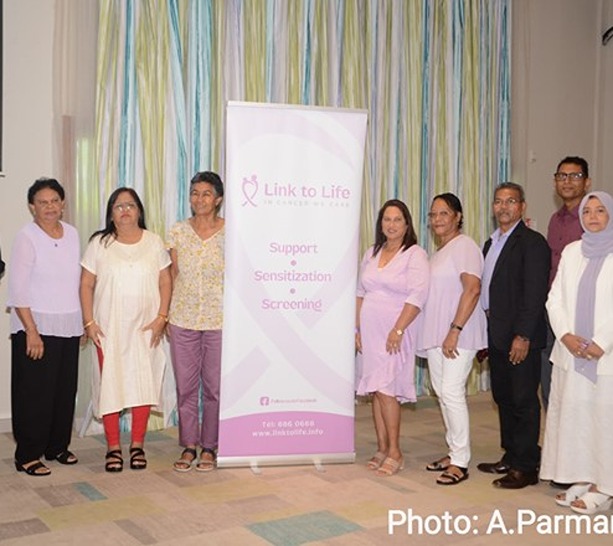For the 20th anniversary of Link to Life celebrated two weeks ago, the NGO unveiled a new visual identity that is more in line with its current reality. A reality made up, among other things, of an increase in their male beneficiaries. The NGO estimates that there is a need to double efforts to raise awareness about cancers in men. A few points with Selvina Moonesawmy, Coordinator of Link to Life.
Lavender, to say what?
We wanted to move away from the pink associated with Breast Cancer to show that our audience is broader. Internationally, the symbol for all types of cancer, including childhood cancers and male specific cancers, is the purple ribbon. We chose lavender, a softened shade of purple so that the change wouldn't be too drastic in the eyes of the public. We not only want to reach more male beneficiaries but children as well. We currently have over 500 beneficiaries, of which about a third are men.
The prevention of male specific cancers at Link to Life.
The majority of male specific cases listed here at Link to Life are prostate cancer, followed by colon cancer. We therefore put quite more emphasis on these two types of cancers. We raise awareness on lung and testicular cancers, which are the other types of situations we handle. Awareness is provided free of charge in community centers and Village Halls while businesses are charged. We also offer on-site screening sessions, upon request.
Screening tests
Prostate cancer screening is carried out through a blood test (PSA Blood test), while colon cancer screening requires more preparation as it involves a stool analysis. As for lung cancer, we partner with C-Care and other private clinics to negotiate packages for lung X-rays. If the screening test shows possible signs of cancer, further tests are necessary to confirm the diagnosis. The person is then referred to the hospital or clinic with their report.
Despite the fact that cancer is on the rise in Mauritius, the taboo surrounding male specific cancers hinders their impetus to get screened, even though screening is the first step in prevention and care and is available for free at health facilities through Link to Life. From the age of 50 and if there are cases of cancer in the immediate family, it is advisable to get tested. This is even recommended annually for prostate cancer.
The main messages from Link to Life regarding male cancers?
Pay attention to the signs and symptoms of prostate cancer: an older person who has difficulty urinating, or notices blood in their urine, or suffers from incontinence, or feels pain in the lower abdomen when urinating, or experiences erectile difficulties.


